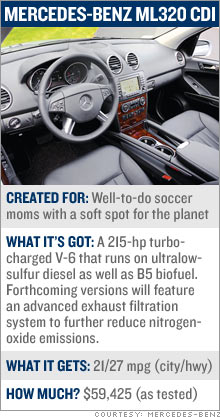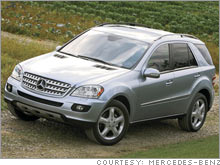Mercedes ML320 CDI: So good, it's illegalThink diesel doesn't get a bad rap? The ML320 CDI is nimble, fuel-efficient, as clean as anything on the road -- and outlawed in five states, writes Business 2.0 Magazine.(Business 2.0 Magazine) -- It's a wonder criminals get caught in this country. I recently spent a week on the lam, and not once did a policeman give me a second glance. And it's not as if I was being inconspicuous -- my getaway vehicle was a shiny 2007 Mercedes-Benz ML320 CDI, one of only a handful of such rides on the road in California.

Of course, therein lay the problem. Driving the CDI in California is, legally speaking, a no-no. You see, the ML320 happens to be powered by a diesel engine, and though its emissions technology is sophisticated enough to clear the regulatory hurdles erected by legislators in 45 of 50 states, California is notoriously tough (as are Maine, Massachusetts, New York, and Vermont). No matter that the SUV's turbocharged V-6 power plant contributes less to global warming than any gas engine out there, or that the nationwide introduction last fall of ultra-low-sulfur diesel fuel has nixed the blue-smoke spew associated with such cars. Until Mercedes (Charts) outfits the ML320 CDI with an additional piece of postcombustion technology to further reduce nitrogen-oxide emissions, which is scheduled to happen next year, the vehicle remains verboten in the Golden State. Call me an outlaw, baby. Now, if you're going to run from The Man, there are few better ways to do so. This is, after all, a Mercedes. And as with every Mercedes -- especially a $60,000 SUV -- luxury abounds. The ML320 is comfy (bird's-eye maple, black napa leather, multiple climate zones, etc.), safe (reinforced body cage, front and rear crumple zones, back-up camera, etc.), and convenient (powerlift rear gate, parktronic, voice control, etc.). Thus, even before we talk about the engine, the ML320 CDI is an easy sell. The diesel closes the deal. For the few of you not conversant in such matters, let's chat about diesel engines. Invented in 1892 by a man named Rudolf Diesel, such power plants tend to be more efficient, reliable, and adaptable than gasoline engines, not to mention cheaper. This explains why half of all European cars are diesel-powered. But due to a plot orchestrated by Henry Ford and the Illuminati (just kidding), diesel engines have never captured American hearts. The lone company to make inroads in our market has been Mercedes; during the 1970s gas crisis, two-thirds of the vehicles it sold here were diesels. Unfortunately, domestic standards for diesel fuel at the time left much to be desired, and these cars belched plumes of acrid exhaust, pinged and knocked, and, in cold climes, started only intermittently. All of which soured the populace on nonpetrol rides. Today a mere 4 percent of vehicles sold in this country are diesels. Happily, diesel technology and refining standards have made much progress since then. As of Oct. 15, 2006, all diesel sold in the United States is of the ultralow-sulfur variety, some 97 percent cleaner than previous versions. Meanwhile, the engines also evolved, becoming smoother, more powerful, and cleaner, advancing to the point where they are almost indistinguishable from their gasoline counterparts. Stand next to an idling ML320 CDI and you'll likely never notice that it's a diesel. Thus automakers such as Mercedes (and Audi, BMW, Ford (Charts, Fortune 500), and VW) are pushing diesel as an economical, environmentally friendly fuel option, with some success. Within eight years, 15 percent of vehicles on American roads are expected to run on diesel. Should this day indeed come to pass, few drivers will benefit more than those behind the wheel of an SUV. Because of compression ratios and a bunch of other stuff you probably don't care about, diesel engines provide an astonishing amount of torque, making them ideally suited to hauling boats, flattening hills, and lugging giant loads of bothersome cargo, such as your kid's lacrosse team. Couple the CDI's 398 pound-feet of torque with a seven-speed automatic transmission and permanent all-wheel-drive, and you've got a nimble, fast, seamlessly shifting 2.5-ton jumbo craft that somehow manages 27 miles to the gallon. You can even run the thing on B5 biofuel -- meaning that my flight from prosecution might well have been fueled with vegetable oil, soybeans, or sunflowers. Not that the coppers were after me, exactly. In fact, toward the end of my scofflaw week, I phoned the California Highway Patrol to see what my odds were of actually getting busted. After I explained that I was writing about -- even touting -- a sensible, fun, fuel-efficient vehicle that was technically still some months from being legal in this state, the CHP spokesperson asked, "You're not going to encourage people to break the law, are you?" Me? Perish the thought. John Tayman, a contributing writer for Business 2.0, is the author of "The Colony" (www.johntayman.com). To send a letter to the editor about this story, click here. |
|

